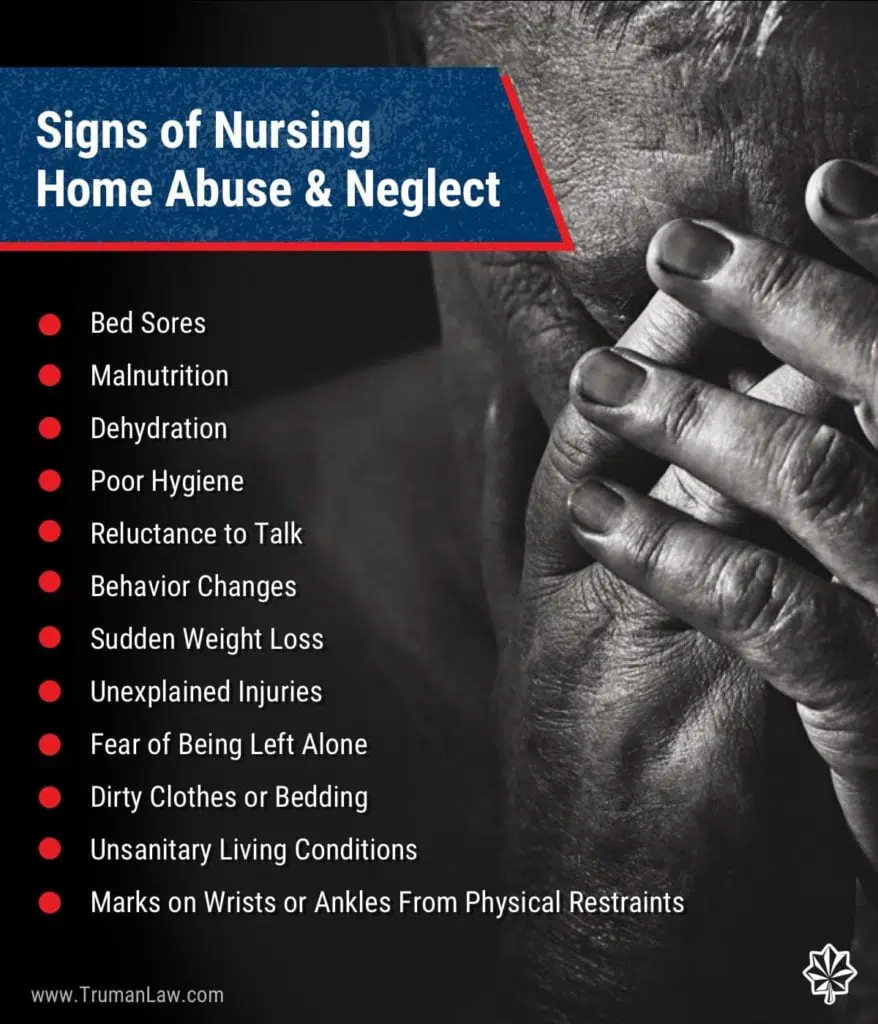Vigilant Louisville Lawyers Protecting Victims of Nursing Home Neglect
When you entrust your loved one to a nursing home, you expect them to be treated with respect and dignity. Unfortunately, this is far from a guarantee, no matter the facility.
Nursing home abuse cases are much more common than people think and can lead to devastation and heartbreak for family members. Under attending caregivers, unsafe conditions or even a lapse of focus can cause significant long-term issues for a nursing home resident. Even the smallest of oversights can lead to a fall or other injury, which can cause long-term medical issues or even death for vulnerable residents.
No matter how safe or attentive a nursing home may seem, it is important to keep an eye out for any signs or signals of nursing home abuse. If you or a family member have suffered nursing home abuse or neglect, call the nursing home abuse lawyers at Karl Truman Law Office today to get the help you deserve.

What Does Nursing Home Neglect and Abuse Look Like?
Nursing home abuse often goes unreported by victims, who may be unable or unwilling to communicate instances of neglect. It is important for family members to watch for signs of nursing home abuse when visiting their loved ones. These signs can sometimes be hard to spot, or easy to explain away, but take note of any out-of-the-ordinary behavior or signs.
Victims of nursing home neglect can be hesitant to report their injuries or condition out of fear of further abuse. Be sure to check in with your loved ones while visiting and ensure they feel safe and well cared for. Even the most professional nursing home facilities can have cases of elder abuse.
Common symptoms of nursing home neglect and abuse include:
- Bed sores
- Unexplained injuries
- Sudden weight loss
- Marks on wrists or ankles from physical restraints
- Poor hygiene
- Behavior changes
- Reluctance to talk
- Fear of being left alone
- Dirty clothes or bedding
- Unsanitary living conditions
- Dehydration
- Malnutrition
Because nursing home abuse is often caused by inappropriate safety measures or inadequate patient monitoring, many patients may be suffering or at risk for injury. It is important to act quickly if you suspect a family member is experiencing neglect or abuse in a nursing home or any other long-term care facility.

Nursing Home Abuse vs Nursing Home Neglect
Nursing Home Neglect
With nursing home neglect, there is no intent on the part of the long-term facility or its staff to cause harm to your loved one. However, they still have a responsibility to maintain a safe environment for their residents.
Nursing home neglect lawsuits against nursing homes and their staff members often stem from:
- Lack of properly monitoring a nursing home resident
- Lack of security
- Lack of safety bars on the beds, in bathrooms, or in showers/bathtubs
- Not cleaning or changing a nursing home resident often enough
- Failure to provide sanitary living conditions
- Failure to prevent dehydration or malnutrition
- Failure to assist in maintaining personal hygiene
- Failure to properly care for medical conditions
Remember, mistreatment doesn’t have to be intentional or malicious to do serious damage, or to be worthy of legal action. Your loved one still deserves fair compensation from the responsible, negligent parties.
Nursing Home Abuse
Nursing home abuse may be construed as when an attending healthcare provider directly causes injury or wrongful death due to negligence, such as administering an incorrect dosage of medication. Abusive behavior can be anything from manipulation to sexual abuse and isn’t always immediately evident.
There are different forms of nursing home abuse, from emotional to physical to financial. Here are some examples of nursing home abuse:
- Unlawful restraint or imprisonment
- Physical abuse or sexual assault
- Verbal abuse or mental cruelty
- Financial exploitation
- Purposeful withholding of medication, food, and/or water
- Purposeful failure to provide safe conditions and protect residents
If you or a family member are experiencing any of these forms of nursing home abuse, don’t wait until it’s too late. Call Karl Truman Law for help with your nursing home abuse lawsuit. Nursing home residents deserve to be treated with respect, and Karl Truman Law is here to hold nursing homes accountable for their care.
How You Can Fight Elder Abuse: Call Health and Family Services and an Experienced Attorney
If you suspect that a family member in a nursing home may be a victim of nursing home abuse or neglect, it may be up to you to report the abuse on their behalf.
Luckily, there are resources available for loved ones to hold nursing homes accountable for neglecting or mistreating their residents. By calling your state’s Health and Family Services department, you can file a report against the neglectful nursing home facility and take action to stop their cycle of abuse.
To ensure that your loved one receives fair compensation for their abuse or neglect, call an experienced personal injury attorney. An attorney can help to communicate with the nursing home on your behalf, gather evidence of abuse, and protect you and your loved ones from any further grief.
It is difficult enough to deal with the discovery of a family member being abused. Let an experienced attorney take care of the difficult leg work so you can focus on helping your loved one recover.
Count on the Colonel—Contact Us Today
When you need legal representation you can trust, contact the Colonel. At Karl Truman Law, we know personal injury law and are ready to fight for your rights when you need us most. If you or a loved one need legal assistance after an injury, contact our team today or call us at (502) 222-2222 to schedule your free consultation with one of our experienced personal injury lawyers.
The content provided here is for informational purposes only and should not be construed as legal advice on any subject.
















